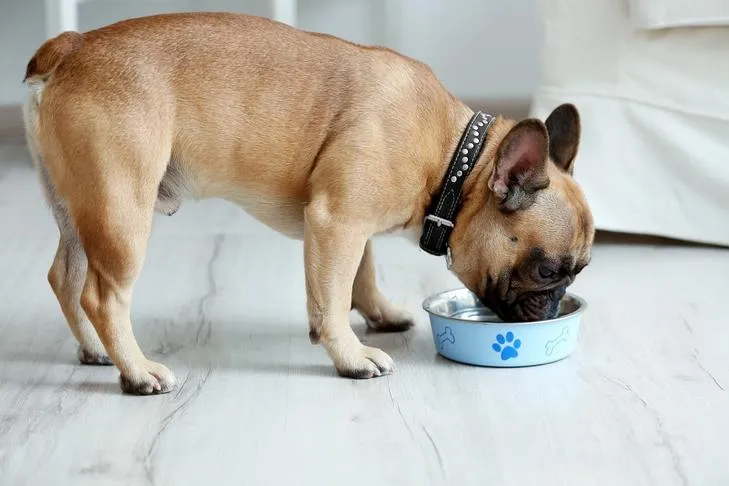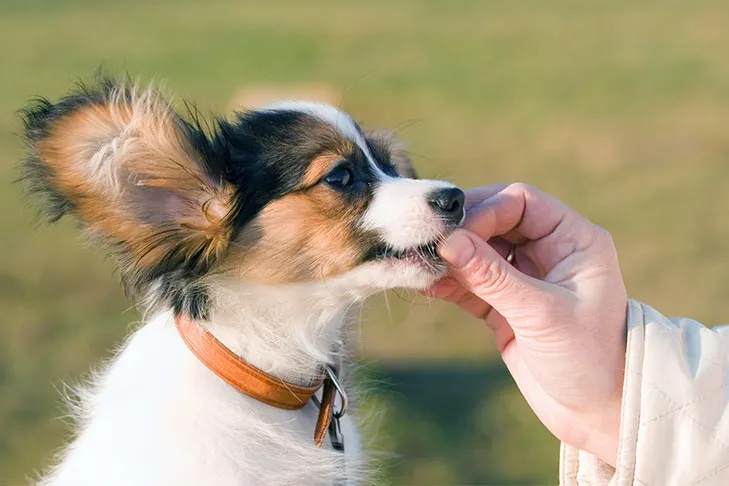As devoted pet parents, it’s natural to want to share everything with our furry companions, especially when they gaze up at us with those irresistible puppy eyes while we’re enjoying a snack. While a dog’s primary diet should always consist of high-quality dog food specifically formulated for their nutritional needs, some human foods can be offered as occasional treats or supplements. Understanding what human food is okay for dogs and, just as crucially, what to avoid, is vital for their health and safety.
This comprehensive guide from Dog Care Story will explore a variety of human foods that are generally safe for canine consumption, along with important precautions and serving suggestions. Remember, moderation is key, and always consult your veterinarian before introducing any new foods into your dog’s diet, especially if they have pre-existing health conditions or allergies. Knowing what is okay to feed dogs can enrich their lives and strengthen your bond.
General Guidelines for Feeding Human Foods to Dogs
Before diving into specific food items, keep these universal rules in mind when offering human food to your dog:
- Moderation is Key: Even safe foods can cause stomach upset or weight gain if given in large quantities. Treats should make up no more than 10% of your dog’s daily caloric intake.
- Plain and Unseasoned: Avoid any human foods with added salt, sugar, spices, onions, garlic, or artificial sweeteners (especially xylitol, which is highly toxic to dogs).
- Cooked, Not Raw: Many foods, particularly meats and eggs, must be thoroughly cooked to eliminate harmful bacteria and parasites.
- Check for Bones and Choking Hazards: Bones, especially cooked ones, can splinter and cause internal damage. Fruit pits, cores, and hard shells can also be choking hazards or contain toxic substances.
- Introduce Slowly: Start with very small amounts of any new food and observe your dog for any signs of digestive upset (vomiting, diarrhea, gas, discomfort).
- Consult Your Veterinarian: When in doubt, always reach out to your vet. They can provide personalized advice based on your dog’s specific health profile.
Safe Human Foods for Dogs: A Detailed List
Here’s a list of common human foods that, with proper preparation and in moderation, can be a safe addition to your dog’s diet:
Bread
Small quantities of plain, unseasoned bread are generally safe for dogs. It offers no significant nutritional benefits but won’t cause harm if given occasionally. Ensure it contains no spices, seeds, or toxic ingredients like raisins or chocolate. Homemade bread is often a better choice than store-bought, which can contain unnecessary preservatives. However, due to its high carbohydrate and calorie content, it’s best to keep bread consumption to a minimum to prevent weight gain.
Cashews
Cashews can be a delightful, albeit occasional, treat for dogs. They are packed with beneficial nutrients such as calcium, magnesium, antioxidants, and protein. However, cashews also contain fats, and too many can contribute to weight gain and potentially pancreatitis. Always offer unsalted cashews, and limit the portion to just a few nuts at a time.
Cheese
Many dogs adore cheese, and in small to moderate quantities, it can be a good treat. If your dog isn’t lactose intolerant (which is rare but possible), cheese can provide protein and calcium. Opt for lower-fat varieties like cottage cheese or mozzarella to avoid excessive fat intake. Harder cheeses also tend to have less lactose. Many pet supply stores also offer dog-specific chews made from dried cheese, such as Himalayan dog chews.
 An All American Dog rests its head on a kitchen table, looking longingly at a piece of cheese.
An All American Dog rests its head on a kitchen table, looking longingly at a piece of cheese.
Coconut
Coconut, in its various forms (flesh, milk, oil), can offer several health benefits for dogs. It contains lauric acid, known for its antibacterial and antiviral properties, which can help support the immune system. Some owners find that coconut can aid in freshening breath and may even alleviate skin conditions like hot spots, flea allergies, and general itchy skin. If feeding fresh coconut, always ensure the furry outer shell is removed to prevent choking or intestinal blockage. Coconut oil can also be given in small amounts or applied topically.
Corn
Corn is a common ingredient in many commercial dog foods, so it’s generally safe. It provides carbohydrates, fiber, and some antioxidants. However, the corn cob itself poses a significant choking hazard and can cause dangerous intestinal blockages. If you’re sharing corn, always ensure it is fully removed from the cob. For a fun, safe alternative, consider a corn-shaped squeaky toy!
Eggs
Cooked eggs are an excellent source of protein, vitamins, and minerals for dogs. They can be particularly helpful for dogs with an upset stomach due to their digestibility. It’s crucial that eggs are fully cooked – scrambled, boiled, or fried without oil or seasonings. Raw egg whites contain avidin, an enzyme that can interfere with biotin absorption, potentially leading to a biotin deficiency over time. Ensure the eggs are thoroughly cooked before offering them to your pet.
Fish
Certain types of cooked fish can be a wonderful, healthy addition to your dog’s diet. Fish provides beneficial omega-3 fatty acids, which support brain function, joint health, and a healthy coat, as well as lean protein and amino acids. Salmon and sardines are particularly beneficial. Salmon is rich in vitamins and protein, while sardines offer digestible bones for extra calcium.
Always ensure fish is fully cooked and cooled. Never feed raw or undercooked fish, as it can contain parasites that are highly toxic and can lead to severe illness or even death in dogs. With the exception of very small, soft bones found in sardines, always meticulously remove all tiny bones from other fish types, as they can splinter and cause internal injury. Limit fish intake to no more than twice a week.
Ham
While a small, plain piece of ham won’t harm your dog, it’s not the healthiest choice. Ham is typically high in sodium and fat, which can contribute to excessive thirst, stomach upset, pancreatitis, and long-term health issues if consumed regularly. If you decide to share a tiny portion, ensure it’s unseasoned and has all excess fat trimmed off. It should be a rare treat, not a continuous habit.
 A French Bulldog eats from a bowl on the floor at home.
A French Bulldog eats from a bowl on the floor at home.
Honey
Honey is a natural sweetener that also boasts a wealth of nutrients, including vitamin A, potassium, calcium, magnesium, copper, and beneficial antioxidants. In small amounts, some anecdotal evidence suggests that local honey might help dogs with seasonal allergies by introducing small amounts of pollen, thereby building immunity to local allergens. Beyond consumption, honey’s natural antibacterial properties also make it a potential topical treatment for minor burns and superficial cuts on the skin. Always offer pure, raw honey in very small quantities.
Milk
While the image of a dog lapping up milk is common, caution is advised. Many adult dogs are lactose intolerant, meaning they lack the enzyme necessary to properly digest the sugar in milk. This can lead to digestive upset, including diarrhea, gas, and stomach pain. While a small amount might be fine for some dogs, it’s best to observe your pet closely for any adverse reactions. For most dogs, water remains the best and safest beverage. If you’re wondering what are food dogs can eat safely, it’s often simpler to stick to solid treats.
Peanut Butter
Peanut butter is a beloved dog treat and an excellent source of protein, heart-healthy fats, and essential vitamins like B and E, along with niacin. The healthiest option is raw, unsalted, and unsweetened peanut butter. Crucially, always read the label carefully to ensure it does not contain xylitol. Xylitol is a common sugar substitute found in many “sugar-free” products, including some peanut butter brands, and is extremely toxic to dogs, capable of causing a rapid drop in blood sugar, liver failure, and even death. If you’re unsure what human peanut butter is safe for dogs, always choose a brand that explicitly states it’s xylitol-free.
Peanuts
Unlike some other nuts that are toxic to dogs (like macadamia nuts) or pose a choking hazard (like almonds), plain, unsalted peanuts are generally safe for dogs to eat in moderation. They offer good fats and proteins that can contribute to your dog’s overall health. However, due to their high fat content, feeding too many peanuts can lead to digestive upset or, in severe cases, pancreatitis. Always avoid salted or seasoned peanuts, as excessive salt is difficult for a dog’s kidneys to process.
Popcorn
Air-popped popcorn, served plain (without salt, butter, or artificial seasonings), can be a fun, occasional treat for your dog. It contains riboflavin and thiamine, which contribute to eye health and digestion, as well as small amounts of iron and protein. The most important precaution is to ensure all kernels are fully popped, as unpopped or partially popped kernels can be a choking hazard or cause dental damage.
Pork
Pork is a highly digestible protein source that contains a good profile of amino acids. Some veterinarians even recommend it for dogs with allergies to other protein sources, as it’s less commonly associated with allergic reactions. While it offers nutritional value, pork typically contains more calories per pound than other meats. When feeding pork, ensure it is thoroughly cooked, unseasoned, and all excess fat and bones are removed. Cooked bones can splinter and cause internal damage. Avoid any pork products with high salt, seasonings, onions, or garlic.
Quinoa
Quinoa is gaining popularity as a superfood for humans and is now found in some high-quality dry dog foods. Its robust nutritional profile, including protein, fiber, and essential amino acids, makes it a healthy and often gluten-free alternative to common starches like corn, wheat, and soy used in kibble. When preparing quinoa for your dog, ensure it is cooked plain and unseasoned.
Salmon
As reiterated, fully cooked salmon is an excellent and highly beneficial source of protein, healthy fats (especially omega-3 fatty acids), and amino acids. These nutrients are crucial for promoting joint flexibility, supporting brain health, and boosting the immune system. The dangers of raw or undercooked salmon cannot be overstated; it can carry parasites that cause “salmon poisoning disease,” leading to severe symptoms like vomiting, diarrhea, dehydration, and potentially fatal outcomes. Always ensure salmon is thoroughly cooked through to eliminate these parasites.
Shrimp
A few cooked shrimp now and then can be a delightful and healthy treat for your dog. Shrimp are low in fat, calories, and carbohydrates, while being rich in antioxidants, vitamin B-12, and phosphorus. The key is to ensure they are fully cooked and that the entire shell, including the tail, head, and legs, is completely removed before offering them to your pet.
Tuna
Cooked, fresh tuna can be given to dogs in small amounts. It is an excellent source of omega-3 fatty acids, which support heart and eye health. When it comes to canned tuna, moderation is even more critical. Canned tuna can contain small amounts of mercury and has a higher sodium content, both of which should be avoided in excess. If you offer canned tuna, choose varieties packed in water (not oil) and ensure there are no added spices or seasonings. A little bit of tuna juice here and there is also fine as an occasional flavor boost. Understanding what can dogs have and not have involves knowing the nuances of each food.
Turkey
Plain, cooked turkey is generally safe and a lean source of protein for dogs. When preparing turkey for your dog, it’s essential to remove all excess fat and skin, as these can be difficult to digest and contribute to pancreatitis. Always check carefully for bones, as poultry bones can splinter easily during digestion, potentially causing blockages or tears in the intestines. Similar to other meats, avoid feeding turkey with excessive salt, seasonings, onions, or garlic, which are harmful to dogs.
 A Samoyed puppy lays comfortably in green grass outdoors.
A Samoyed puppy lays comfortably in green grass outdoors.
Wheat or Grains
The idea that dogs need a grain-free diet is a common misconception unless a specific allergy has been diagnosed by a veterinarian. Grains like wheat and corn are not inherently bad for dogs; in fact, they can be excellent sources of protein, essential fatty acids, and fiber, contributing to a balanced diet. If your dog does have a confirmed grain allergy or sensitivity, then avoiding grains is appropriate. Otherwise, there’s no need to exclude them from your dog’s diet. Always consult your veterinarian for specific dietary recommendations.
Yogurt
Plain, unsweetened yogurt can be a perfectly acceptable and even beneficial snack for many dogs. The active bacteria (probiotics) found in yogurt can help strengthen and support a healthy digestive system. However, like milk, some dogs may have trouble digesting dairy products. Opt for plain yogurt without any added sugar, artificial sweeteners (especially xylitol), or fruit flavorings, as these can be harmful. Always start with a small amount to see how your dog reacts.
 A Papillon puppy gently takes a treat from a human hand, showing its delicate manners.
A Papillon puppy gently takes a treat from a human hand, showing its delicate manners.
What Human Foods Should Dogs NEVER Eat?
While this article focuses on safe human foods, it’s equally, if not more, important to be aware of the foods that are toxic and dangerous for dogs. Common examples include chocolate, grapes and raisins, onions, garlic, avocado, macadamia nuts, xylitol, and alcohol. These can cause severe illness, organ damage, or even be fatal. For a detailed list of foods to strictly avoid, please refer to our dedicated article on what vegetables should dogs not have and other harmful human foods.
Always Consult Your Veterinarian
The information provided here is for general guidance. Every dog is unique, with individual dietary needs, sensitivities, and health conditions. Factors such as age, breed, activity level, and existing medical issues can influence what human foods are appropriate for your pet.
Conclusion
Sharing safe human foods with your dog can be a rewarding experience, offering them new flavors and textures while potentially boosting their nutrition. By understanding what human food is okay for dogs and adhering to guidelines of moderation, proper preparation, and avoiding harmful ingredients, you can safely include these treats in their routine. Always prioritize your dog’s primary, veterinarian-approved diet, and consider human foods as supplementary delights. When in doubt, or if your dog experiences any adverse reactions after consuming new food, do not hesitate to contact your veterinarian immediately.
For more valuable insights into canine nutrition and care, explore other articles on Dog Care Story!
